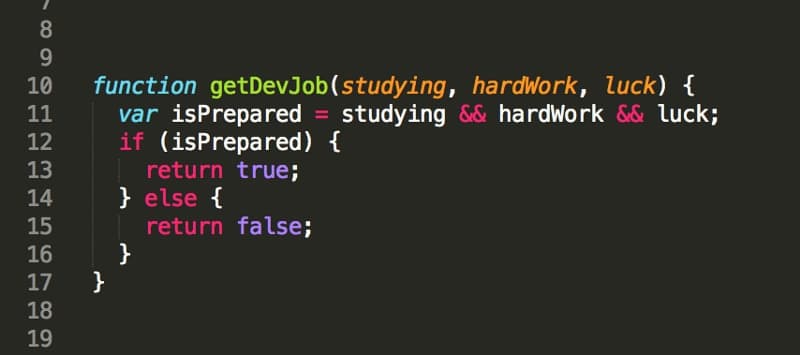Ten Better (for most) Alternatives to an MBA
“Should I do an MBA?”
I get asked this question often by juniors and peers at the companies at which I’ve worked or to which I’ve consulted.
Frankly, as the people who ask me know me well, and my predisposition against MBAs, they often phrase it timidly… like “So… I’m thinking of doing an MBA”.
I’m usually flattered that they’d consider my opinion, and then I tell them, flatly:
NO. You shouldn’t get an MBA. (Except sometimes.)
Here are all the reasons why.
When You Should Actually Get an MBA… Three Situations
There are very limited circumstances where an MBA is actually a good investment.
The only no-brainer situations in which you should do an MBA are:
- When you have no idea what to do next or are very open-minded, and the MBA is free/heavily subsidised and from a very good school (it’s paid for by your company, or you get a full ride… and you’re still foregoing $2-300,000 in money you would have earned in that period, by the way, if you have a traditional job)
- You want to get into consulting (but only to a top 3 firm where the MBA is particularly important) or finance, where the MBA is often a prerequisite, and again, you get into one of the top schools.
- You feel like taking an expensive break and it’s your money and life and you’ll do what you like with it. (I.e. “Because I want to”).
The first two are decent reasons, but I honestly can’t think of another good reason.
The third reason is one I often hear and find it impossible to argue with. You do you, after all!
Bad Reasons for Getting an MBA
I’ve heard a lot of rationales for why a person would want an MBA, but many of them are ill-informed.
If one of these is your reasons for getting an MBA, it’s not a very good justification — you could achieve the same thing, more effectively and more cheaply, elsewhere.
Here are some reasons to get an MBA:
- “Build a network”. An MBA gives you a network of sorts, but really, they’re just friends. You build better networks at jobs or in projects, where you’ve been in the trenches with people and see what they’re really made of (and they see what you’re made of). At your MBA, your best contacts will likely be people in societies and team projects with you — and the best people will find each other, just like they do elsewhere.
- “Get a brand name.” The brand name of every business school is mixed in some way. I’ve interviewed for jobs candidates from HBS, Columbia, Wharton, LBS and other schools and crushed their spirits when I poked holes in their presentations, and obviously didn’t give them the job. And I’ve worked with many people with no MBA who were absolute weapons (looking at you, Ed, DK, Nino, Niko, etc.). The people who were great from those schools were great before they went to those schools — they lent their own branding to the school.
- “Open doors”. You can open doors on your own. Go cold call, email, make friends. That’s all your business school is going to give you the courage to do.
- “Take a mid-career break.” Such an expensive break. Even a six-month sabbatical surfing or eating your way through Europe would be cheaper. Usually a waste of time, unless you have very clear reasons for doing an MBA. Do one of the things below.
So here are ten things that I think are more useful things than an MBA — the best alternatives to an MBA that I can think of.
1. Do a three-month coding or app-building “bootcamp”

Unless you already can, I guarantee during your MBA, you’ll wish you could code. Maybe you already wish you could code!
You’ll have some business idea and then think “Now I need someone to build it”. Wouldn’t it be good if you could at least get it started? At least know how to use no-code tools?
Many MBA students who can’t code end up going to startup weekends and saying they want to be a “business co-founder”. In other words, they want to have the ideas and make presentations and talk to people — maybe even be the CEO — but not actually build the product.
It’s possible they’ll find a technical co-founder who doesn’t want to talk to people, but the reality is that you don’t have to do much talking to found a company.
Conversely, many engineers who are skilled at building (and know how to think of good ideas) rarely need a “business co-founder”, i.e. someone who won’t be able to do anything useful. They might need a professional manager once they’ve raised maybe $20-50M… but most startups don’t go that far. And your MBA is unlikely to give you the experience to do that job well.
2. Do a “Startup weekend” where you build a product in two days
Doing a “Startup weekend” is how my friend Rauno met his co-founders for his business Qminder, which is still one of the biggest apps for managing queues that I know about.
He was the “business guy” (and no, he doesn’t have an MBA!) who helped define the idea and concept. He’s still the CEO, the person who manages the whole team, and just a terrific person.
But even if you don’t end up building a huge business, a startup weekend — or any event where you go and try to get an idea to product and then to market — is a great way to test your thinking and see if it has any grounding in reality.
3. Spend 10,000 (a tiny fraction of an MBA cost) actually trying to launch a product.
An MBA costs a lot — even if you are sponsored or have a scholarship. You forego 1-2 years of salary and have to spend a lot on living expenses.
Trying to build your own startup, launch a product, or anything is very hard and will tell you a lot about your own psychology, skills required to market a new product, do customer research, and countless other things.
Plus, you’ll have lower living costs, because you won’t have to live near the business school and can maybe do it from somewhere like Taiwan, Estonia, or another high-tech startup-friendly country that’s not expensive to live in.
So take one of your ideas — or ten of them — then build a business case and project plan for them, and start investing in your own projects, and see where it takes you.
The ROI isn’t just a possibly successful project — a failed project brings a good set of lessons for the next project, and a good story in case you want to get a job again.
4. Learn another language (maybe you have enough of these)
Learning another language is one of my favourite alternatives to an MBA.
I made his choice myself over 10 years ago when I decided to study Chinese instead of doing an MBA.
The benefits of learning another language for your career are actually somewhat intangible.
Yes, knowing French would help you work in a French-speaking country. And knowing Mandarin Chinese helps you talk to Chinese business partners.
But another, more unusual benefit, is that knowing another language makes you interesting. There have been many interviews where people remember me later as “that guy who speaks Chinese”. “He speaks Chinese?? What else can he do?” It adds intrigue.
Learning languages helps you in many other ways. You build a network with your co-students and expats in the country where you’re based. You develop cultural fluency. You expand your mind and push your boundaries, which translate into many endeavours. And so on.
As for what language to learn to boost your career – that’s a bigger question. But you can’t go wrong with Chinese, Arabic, or Russian.
5. Learn how to write advertising copy
Read books on ads. Learn how to work a marketing funnel.
Start with these books on copywriting.
Learning to write advertising copy is akin to learning to write “for the web”. Writing advertising copy means
- Understanding your target customer (your readers)
- Engaging them
- Keeping them engaged
- Converting them to a sale or whatever
Advertising-style writing is useful everywhere. Even if you’re not selling something, when you write words, you always have a goal in mind — even if it’s to just keep someone reading.
You can start with these business writing tips, which I think are applicable everywhere in modern writing.
6. Cold-call 10 people trying to build ideas for a business.
Many students in a business school program tell me about the scary marketing class where they got an assignment in which they had to cold call people.
Do this yourself. Cold call ten people saying you’re a local entrepreneur and want to build a business, and see if you can build enough rapport to meet with them.
Some examples are
- A local doctor
- A local dentist
- A local chiropractor
- A local lawyer
All of these are busy people who earn lots of money. It’s easier if you’re already their patient or client. Say you’re working on software, and would be happy to help them with any problems they have. It can go in so many directions… you may be surprised.
Note — there’s an art to this. Do it in a human way, building real rapport by complimenting them and so on. Don’t make the mistake of being the 100th person to say you want to “pick their brain” or just buy them lunch. Make it of interest to them!
7. Start a podcast or blog interviewing cool people as a way to network
Many people I know have gotten their ideas from starting a podcast or blog. They email people they admire in industries they like, interview them, and learn more about other people, the industry they’re in, and any gaps where they might be able to start something.
Often the blogs or podcasts themselves end up being the businesses themselves (or at least become one of the businesses).
When you reach out to someone through a trusted network, like Indie Hackers or Reddit, people are very receptive.
8. Start writing stock analyses, make some investments, and report the results.
A lot of people like to talk about the stock market, speculating that prices of something will go up or down, etc. A lot of talk, and little action.
Many people, before making their first investment, will think they want to be “like Warren Buffett” or some other big investor or trader.
Relatively few people, on the other hand, actually put their money where their mouths are.
Here’s an idea
- Write an investment thesis for something, whether it’s a stock, a currency, or whatever.
- Publish it in some format, even if it’s just a shared Google doc. Shop it around to people who might give you a useful opinion. If you’re very brave, publish it on Reddit. (Probably not)
- Invest a significant out of money, e.g. 1% of the cash you have.
- Wait for the results.
- Publish those, too.
You’ll likely learn a lot about yourself in this process, including your tolerance for risk, your ability to do detailed research, and the kinds of assets you like to invest in. Do this ten times and you’ll have more experience than most people in your finance courses in any MBA program.
9. Master online marketing through courses and practise.
Writing a blog and building has been a huge education for me. It has helped me clarify my thinking and understand a lot about the marketing funnel.
How do customers end up on a web page and then convert to a purchase? What’s customer value and lifecycle? How do you improve all the bits of a funnel?
Running websites from e-commerce to affiliate sites and ad-driven sites has helped me understand
- SEO — How to attract customers through natural traffic
- Social media — Still a noob at this, but at least my partner figured out Pinterest a while ago
- Advertising — understanding the value of pay-per-click advertising
- Conversion optimisation — How to convert those visitors into revenue
- Growth — How to keep growing your website in every direction
SEO itself is a continuing and humbling education and could be a whole area of specialisation.
10. Decide on three very famous people you’d like an opinion from and work every channel until you get a response
A very famous exercise that someone proposed once in business school (I think it was Tim Ferriss, while doing a guest lecture) was the idea that you should pick a famous person — Beyoncé, Bill Gates, the Queen, whoever you want — and try to get a response.
I’m not really sure of the benefit of this, other than it takes chutzpah and creativity to actually do it. Sometimes you have to really know about someone and admire them to get a response that’s worthwhile.
But knowing that it’s a frequently-mandated class in business school tells me: just do it yourself, for free.
Got another idea? Drop me a line.







